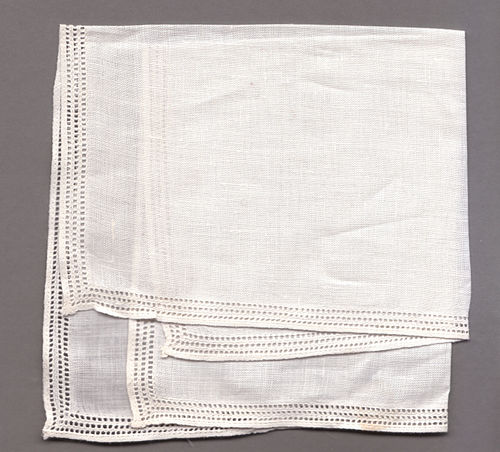Linennoun
(uncountable) Thread or cloth made from flax fiber.
Linennoun
(countable) Domestic textiles, such as tablecloths, bedding, towels, underclothes, etc., that are made of linen or linen-like fabrics of cotton or other fibers; linens.
Linennoun
A light beige colour, like that of linen cloth undyed.
Linenadjective
Made from linen cloth or thread.
Linenadjective
Having the colour linen, light beige.
Linenadjective
Made of linen; as, linen cloth; a linen stocking.
Linenadjective
Resembling linen cloth; white; pale.
Linennoun
Thread or cloth made of flax or (rarely) of hemp; - used in a general sense to include cambric, shirting, sheeting, towels, tablecloths, etc.; as, bed linens
Linennoun
Underclothing, esp. the shirt, as being, in former times, chiefly made of linen.
Linennoun
a fabric woven with fibers from the flax plant
Linennoun
a high-quality paper made of linen fibers or with a linen finish
Linennoun
white goods or clothing made with linen cloth
Linennoun
cloth woven from flax
Linennoun
articles such as sheets or clothes made, or originally made, of linen
Linen
Linen () is a textile made from the fibers of the flax plant. Linen is very strong, absorbent, and dries faster than cotton.
Jutenoun
The coarse, strong fiber of the East Indian plant, Corchorus olitorius, used to make mats, paper, gunny cloth etc.
Jutenoun
The plants from which this fibre is obtained.
Jutenoun
The coarse, strong fiber of the East Indian Corchorus olitorius, and Corchorus capsularis; also, the plant itself. The fiber is much used for making mats, gunny cloth, cordage, hangings, paper, etc.
Jutenoun
a plant fiber used in making rope or sacks
Jutenoun
a member of a Germanic people who conquered England and merged with the Angles and Saxons to become Anglo-Saxons
Jutenoun
a member of a Germanic people that (according to Bede) joined the Angles and Saxons in invading Britain in the 5th century, settling in a region including Kent and the Isle of Wight. They may have come from Jutland.
Jute
Jute is a long, soft, shiny bast fiber that can be spun into coarse, strong threads. It is produced from flowering plants in the genus Corchorus, which is in the mallow family Malvaceae.




















